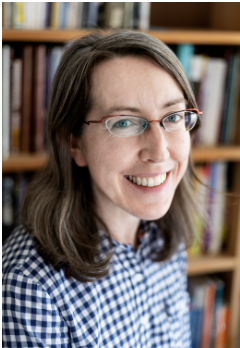Now Approaching Porter Square
Amy M. Clark
On the Kendall Station platform,
I leave a dollar for the young woman
playing an accordion while stomping one foot
harnessed to a pulley that sets to dancing
her dressed-to-match marionette double
strung inside a suitcase box, one thin arm raised,
its painted red smile a fixed version
of the busking girl’s real one.
Trains running late, we pack in,
close enough to smell each other’s leather
and perfume. The arm belonged to Mrs. Danvers,
I read from the book held open next to me,
clothbound, from the library, fitting
for the reader in a pink wool coat. Last night I dreamt
I went to Manderley again. I don’t know whom
any of these arms belong to, nor these hands
holding devices, these shoulders slung with bags.
As I grip the overhead strap, swaying
and steadying myself, my other hand dangles
empty, phoneless, bookless, ringless,
two inches from a stranger’s. A firm hand,
long fingers, white shirt cuff. For a moment
I forget where I am, so strong
is my urge to slip my hand into that one,
as if it were familiar, as if it were
the most natural thing in the world.
Originally published in Cloudbank (Issue 12, 2018) and Roundabout (Press 53, 2020).
* Writing Prompt: Encounters with strangers, even if brief, can be transformative. Contemplation of another is a form of connection. Begin with a close observation and description of someone you don’t know. Then, let a telling detail from that description, along with the emotion(s) it evokes in you, lead you through the rest of the poem.
Prayer After
Amanda Hope
I pray to whichever god keeps me from missing trains.
Each prayer exacts a price. This time I give my lungs.
Not all parts of the self are needed in this world.
Sometimes damage is beautiful — the spark
Of the pitted window, the glaze of colors in the spilled oil
Coating the feathers of a dying bird. I give my fingers,
And pray to the god who turns doorknobs and ties shoes.
Would it surprise you to learn what I can do without?
I lived ten years as a creature of claws, trying to conjure
Kindness by spilling blood. Another ten I was a lizard
And whenever someone reached for me, my tail fell off in their hand.
Now I have traded my apologies to the god who gives bread,
My secrets to the one who will grant me a warm place
To curl in sleep. All that is left to me, my
Fear of doing harm, more vivid than the memory
Of temperate seasons. I pray to whichever god will take it,
Leaving me simple. Leaving me shimmer. Leaving me
What’s left, unrecognizable, imperfect and final.
Previously published in Harpur Palate (Vol. 16, No. 1, Summer/Fall 2016) and the chapbook The Museum of Resentments (Paper Nautilus, 2020).
* Writing Prompt: Imagine a god that is in charge of a small, ordinary part of your life. What would this god require of you? How would you engage with it? How would you be changed by having a relationship with it?

Amy M. Clark’s second book of poems, Roundabout, was published by Press 53 in 2020. She is co-author with Molly Peacock of a chapbook, A Turn Around the Mansion Grounds: Poems in Conversation & a Conversation (Slapering Hol Press, 2014). Her first book of poems, Stray Home (University of North Texas Press, 2010), won the Vassar Miller Prize in Poetry and was named a “must-read” by the Massachusetts Center for the Book. Her poems have appeared on the Writer’s Almanac, in the anthology Good Poems, American Places (Viking 2011), and in various journals. She lives in Stow, Massachusetts. More at amymclark.com.

Amanda Hope lives in eastern Massachusetts with her partner and cats. A graduate of Colgate University and Simmons College, she works as a librarian. Her chapbook, The Museum of Resentments, was published by Paper Nautilus in 2020. You can find more information about her work at her website, http://www.amandahope.net. (Headshot photo credit: Lilia Volodina)
